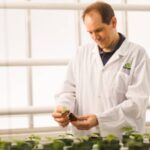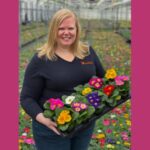Technology, Apps and Other Greenhouse Solutions
So, you’re the company tech person. Your job is to keep the facility up and running at the same time keep up with all the new technology and gadgets. Wow, what a fun job you must have! Your boss tells you to go out to a trade show and report back with what’s new.
As you walk the show floor you are in awe of all the new gadgets not to mention the sticker shock, and now you are at a crossroad. Do you return with the updated news and try to explain why you really need the new gadget or go back and just report the news?
With how fast technology is changing, it seems like just when you buy something you see an updated version the following week. All the new apps are supposed to help us in our jobs. But with apps for just about everything, which ones do you need? Which ones are best for you and your operation?
Eventually you have the facility set up with whatever apps/machines that seem to work. If you purchase an app, what is the app developer/manager doing? Are they watching and paying attention to what you are doing? Did you factor in the monitoring to your decision? How much security/privacy did you have to give up for the luxury of the app?
ANALYZE AND ADAPT
Drones are one of the newer gadgets we are being told to use in our industry, but with all the restrictions and rules that need to be followed, does a drone make sense for your facility? As we know what works for one company doesn’t necessarily work for another. We have apps that can open/close vents, control the temperature, alert us on weather conditions, etc. Are you interested in drones for crop monitoring, inventory assistance or even pesticide delivery?
GPS units can help guide tractors to be more efficient in the fields and are widely used in some parts of our industry like cut flowers, foliage and field-grown woody ornamentals. The initial capital outlay can be prohibitive unless you can analyze and demonstrate the cost benefit down the road.
Adopting new technologies can require time too; they don’t come plug and play. I know of one company that purchased a tractor with GPS, and it took more than six months to successfully work it into their production process. But what happens if (when) this newly developed technology fails? The spray guy sets up a very early morning spray with a pesticide and tractor, he enters the GPS coordinates and lets it rip. Does he stay to monitor the application or let the driver do all the work?
Remember early on when most GPS units told you to go down a road (and you followed directions) only to find a creek or dead end road, or that a road was planned but never completed. That didn’t show up on your unit. So you turned around and drove back to your crossroad.
So the real answer to adapting new technology, apps and equipment is based on doing a full background analysis of how you will benefit — including the return on investment. It is not up to the developer to follow up with you to make sure you even understood what you were purchasing. Be sure you get the assistance that you need. Our industry has many consultants for different technologies … use them! And keep in mind that the technology expert/salesperson for the device may be a great resource or lead you to a purchase that does not meet your needs. Do your homework!
MONITOR RESULTS
And finally, follow up. Don’t magically expect a new technology to be successful for you unless you monitor the results. The last thing you want to do is purchase something only to find it sitting in storage gathering rust/dust or spiders. This goes for apps too. Perform periodic evaluations asking the appropriate people how things are working for them. Be proactive.
If the technology automatically gathers its own information (in a cloud), then keep your data safe. Hackers are always busy; now with the newest “CryptoJacking,” even the data you store in the cloud isn’t 100 percent safe. If you can’t access your data, you can’t determine the value of the tool and you therefore can’t prove to anyone that it was a worthy purchase.
We recently asked for ideas that we could pursue to help our industry. The suggestion was: “a new and unique consulting application that can include chemicals, labels, plant disease treatment charts, rate calculator, newsletter and more…”
Not everything can be turned into an effective app that would in essence replace our brain. And besides, that would entirely replace Ann and then she would be obsolete!
Chase Agricultural Consulting, LLC was formed at the end of 2011 when Ann (A.R.) Chase and Mike Zemke moved to Arizona. Ann has more than 35 years experience in research, diagnostics and practical consulting in plant pathology. She has been retired from the University of Florida – Mid Florida Research and Education Center in Apopka since 1994, but remains on staff as a Professor Emeritus. Mike holds an Associate of Applied Science in manufacturing drafting. Mike started his education in horticulture when he and Ann were married in 1995. He specializes in communications of all sorts within the industry.


 Video Library
Video Library 




















